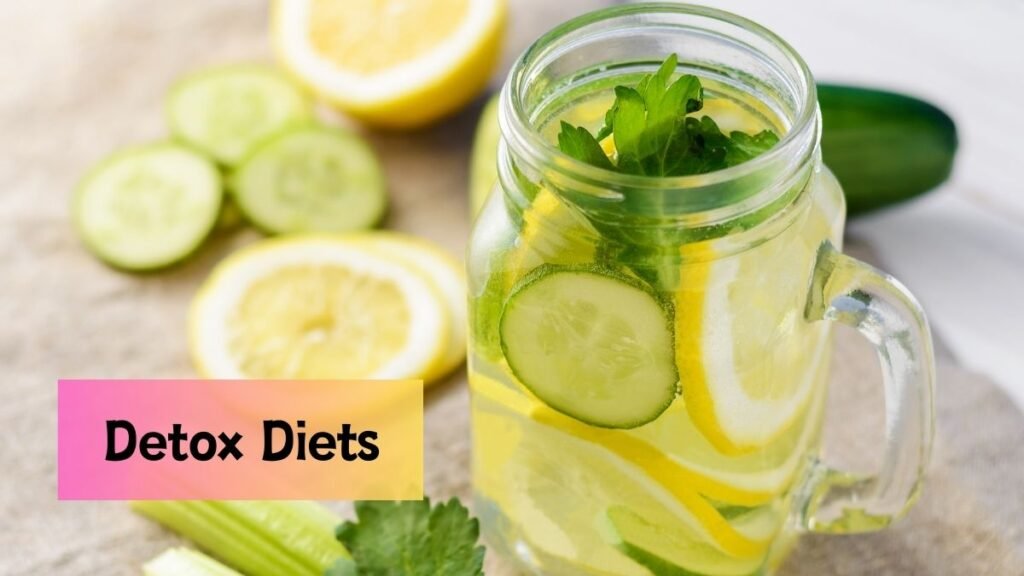Detox diets have gained popularity as a quick-fix solution to cleanse the body and shed extra pounds. Promoted widely by celebrities and wellness influencers, these diets promise rapid weight loss and an array of health benefits. But do they live up to the hype?
This article delves into the science behind detox diets, their effectiveness for weight loss, and whether they truly benefit your body.
What Are Detox Diets?
Detox diets typically involve short-term dietary interventions that aim to eliminate toxins from the body. Common forms of detox diets include juice cleanses, fasting, or consuming specific foods and beverages like green tea, lemon water, or detox waters infused with herbs and fruits. These diets often limit the intake of processed foods, sugar, alcohol, and caffeine.
Types of Detox Diets
- Juice Cleanses: Involves consuming only fruit and vegetable juices for a set period.
- Water Detox: Drinking water mixed with lemon, apple cider vinegar, or other additives to flush out toxins.
- Fasting: Some detox programs require fasting, allowing only liquids or very minimal food intake.
- Herbal Detox: Involves teas or supplements claiming to support liver function and promote weight loss.
Do Detox Diets Help with Weight Loss?
While detox diets may result in quick weight loss, it’s important to understand what is being lost. Most of the weight shed during a detox comes from water weight, not fat.
The extreme calorie restriction involved in many detox programs leads to a temporary reduction in water retention and glycogen stores, giving the illusion of weight loss. However, this weight is typically regained once regular eating resumes.
Moreover, the calorie deficit caused by detox diets is often unsustainable. Once a person returns to a normal diet, the body tends to regain the lost pounds quickly.
Detox diets also lack the necessary nutrients to support long-term health and may lead to fatigue, dizziness, and muscle loss.
The Science Behind Detoxification
Detox diets are based on the premise that the body needs help eliminating toxins that accumulate from food, air, and water. However, the human body is naturally equipped with its own detoxification system. The liver, kidneys, skin, and lungs work continuously to process and remove harmful substances from the body.
There is no scientific evidence to support the claim that detox diets enhance this natural process. In fact, experts argue that the best way to support your body’s detoxification is by maintaining a balanced diet rich in whole foods, staying hydrated, and getting regular exercise.
| Detox Diets | Sustainable Weight Loss Diet |
|---|---|
| Involves severe calorie restriction | Focuses on gradual, consistent calorie reduction |
| Short-term, typically 3-7 days | Long-term, sustainable lifestyle changes |
| Results in water weight loss | Aims for fat loss while maintaining muscle mass |
| Lacks essential nutrients | Balanced intake of protein, carbohydrates, and fats |
| Can lead to fatigue and nutrient deficiencies | Supports energy levels and overall health |
Health Risks of Detox Diets
While detox diets may seem harmless, they can have adverse effects on your health. Common side effects include:
- Nutrient Deficiencies: Detox diets often lack essential vitamins, minerals, and macronutrients like protein and fats. Long-term nutrient deficiencies can impair immune function, weaken muscles, and slow down metabolism.
- Electrolyte Imbalances: Detox diets that involve excessive water consumption or the use of diuretics can lead to imbalances in electrolytes such as sodium and potassium. This can result in dehydration, muscle cramps, and in severe cases, heart complications.
- Disruption of Metabolism: Restrictive diets can slow down metabolism over time, making it harder to lose weight in the long run. Yo-yo dieting, where you repeatedly lose and regain weight, has been shown to increase the risk of obesity and heart disease.
A Balanced Approach to Weight Loss

Instead of resorting to extreme detox diets, a more sustainable approach to weight loss focuses on balanced eating and healthy lifestyle habits. This includes:
- Eating whole, unprocessed foods: Incorporating fruits, vegetables, lean proteins, and whole grains can provide your body with the nutrients it needs to support weight loss and overall health.
- Staying hydrated: Drinking enough water helps the body eliminate waste naturally.
- Exercise: Regular physical activity boosts metabolism and aids in long-term fat loss.
- Adequate sleep: Getting enough rest supports hormone regulation and recovery.
Conclusion
While detox diets may offer quick, temporary weight loss, they are not a sustainable or healthy long-term solution. The weight lost during a detox is primarily water weight, and many detox diets lack essential nutrients that the body needs to function properly.
For effective weight loss and overall well-being, it’s better to focus on a balanced diet rich in whole foods, regular exercise, and hydration. Always consult a healthcare provider before starting any diet to ensure it is safe for you.
FAQs
1. Do detox diets help you lose fat?
No, most weight lost during a detox is water weight. Fat loss requires sustained calorie reduction and exercise.
2. Are detox diets safe?
Detox diets can be unsafe if followed for extended periods. They often lack essential nutrients and can lead to fatigue, dizziness, and other health issues.
3. How long should I follow a detox diet?
Most detox diets are meant to be followed for a short period, usually 3-7 days. However, experts recommend focusing on long-term, sustainable lifestyle changes for better results.
4. What is a safer alternative to detox diets?
A balanced diet with whole foods, regular physical activity, and staying hydrated is a safer and more effective approach to weight loss.
5. Can detox diets help remove toxins from the body?
No scientific evidence supports the claim that detox diets enhance the body’s natural detoxification processes. Your liver, kidneys, and skin naturally remove toxins.
References
- INTEGRIS Health. “Detox Diets: Do They Work or Are They Just a Trend?” 2024.
- Cleveland Clinic. “Detox or Cleanse? What To Know Before You Start.” 2024.
- Healthline. “Do Detox Diets and Cleanses Really Work?” 2024.
- GoodRx. “Health Debunked: Do Detox Diets Work?” 2024.



